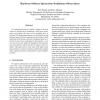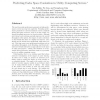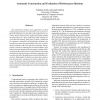IPPS
2005
IEEE
14 years 5 months ago
2005
IEEE
The scheduler is a key component in determining the overall performance of a parallel computer, and as we show here, the schedulers in wide use today exhibit large unexplained gap...
IPPS
2005
IEEE
14 years 5 months ago
2005
IEEE
As computational devices continue to advance, there are reasons to examine their foundations a little more deeply, and to ask whether there may not be something more to be found. ...
IPPS
2005
IEEE
14 years 5 months ago
2005
IEEE
1 Electronic fair-exchange protocols have received significant attention from the research community in the recent past. In loose terms, the fair exchange problem is defined as at...
IPPS
2005
IEEE
14 years 5 months ago
2005
IEEE
IPPS
2005
IEEE
14 years 5 months ago
2005
IEEE
Conventional performance evaluation mechanisms focus on dedicated distributed systems. Grid computing infrastructure, on another hand, is a shared collaborative environment constr...
IPPS
2005
IEEE
14 years 5 months ago
2005
IEEE
In this paper, our contributions are two-fold: First, we enhance the Min-Min and Sufferage heuristics under three risk modes driven by security concerns. Second, we propose a new ...
IPPS
2005
IEEE
14 years 5 months ago
2005
IEEE
The need to provide performance guarantee in high performance servers has long been neglected. Providing performance guarantee in current and future servers is difficult because �...
IPPS
2005
IEEE
14 years 5 months ago
2005
IEEE
The performance skeleton of an application is a short running program whose execution time in any scenario reflects the estimated execution time of the application it represents....
IPPS
2005
IEEE
14 years 5 months ago
2005
IEEE
Mobile Peer-to-Peer (MP2P) systems consist of mobile peers that collaborate with each other to complete application problems. Information sharing in such environments is a challen...
IPPS
2005
IEEE
14 years 5 months ago
2005
IEEE
Reconfigurable computing offers the promise of performing computations in hardware to increase performance and efficiency while retaining much of the flexibility of a software sol...





